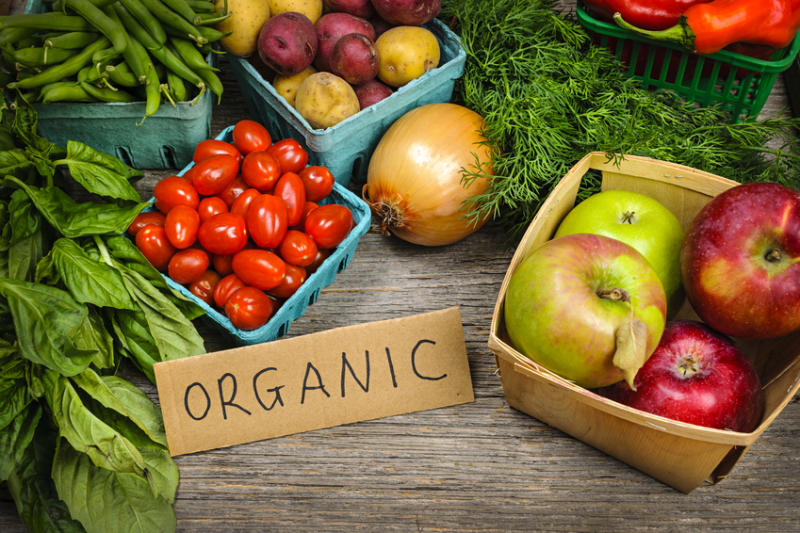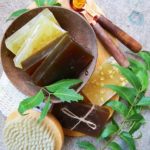Organic food is becoming more popular as the newer generations become more aware of the potential risks of consuming conventional foods. When I became pregnant with my first child about five years ago, I decided after alot of research that I would feed my daughter an all-organic diet. I was able to find organic baby food, cereals, and snacks, and juices at health food stores. As my daughter grew older finding a variety of organic fresh vegetables and fruits became more difficult. Now my children eat mostly organic but they also eat meals with conventionally grown ingredients as well. Now many local grocery stores feature organic options which makes life just a little bit easier!
What is meant by organic?
The word organic refers to the way that foods such as vegetables, fruits, meats, grains, and dairy, are grown or processed. Organic farmers do not use synthetic/chemical fertilizers or pesticides or chemcial additives such as preservatives, colouring, flavouring, MSG, etc. during the processing phase.
Why choose organic foods over conventional foods?
1. No genetically modified foods or ingredients
Organic regulations prohibit bioengineering and the use of genetically modified ingredients. Genetically modified is a term used to describe an organism containing genetic material (DNA) that has been unnaturally altered to improve or correct a flaw, which in turn results in a higher crop yield.
2. Limited exposure to pesticides
Conventional farmers use synthetic pesticides to protect their fruits and vegetables from insects and diseases, thereby increasing yield. This leaves a chemical residue on the conventionally-grown fruit and vegetable which is not present on the organically grown counterpart.
3. Limited exposure to chemical additives
Strict organic standards ban or highly limit the use of chemical additives such as preservatives, colouring, flavouring, processing aids, sweeteners, MSG, and more on organic products.
4. Protect the environment
Organic farming reduces pollution, conserves water, and protects the quality of the farmland for the use of future generations.
5. More ethical treatment of animals raised for food
Organically raised animals are never confined to cages or crates and over-crowding is not an issue. These animals are given daily access, weather-premitted, to roam in the pastures and scrounge for food. Their feed is all-organic, and they are not given growth hormones or antibiotics. The environment that these animals are raised in is free from pesticides and synthetic fertilizers as well.
6. Better tasting food
Although there isn’t much research to suggest that organic foods are more nutritious than conventionally grown foods, there is a significant difference in taste between organic and non-organic food. Organic meats known to be more juicer and organic fruits and vegetables are definitely more sweeter.
What is the downside to buying organic?
As someone who has bought organic for the past five years, I can personally tell you that it gets very expensive. Some budget-friendly tips include: looking for items on sale, purchasing in bulk, and buying seasonal fruits and vegetables.
Another downside is that organic produce tends to spoil faster because of the lack of preservatives and use of wax. I would recommend buying fresh produce as you need them, to avoid spoilage and wasting both food and money.
Which foods should I buy organic?
The following foods are those that are more likely to be grown with the overuse of pesticides, hormones, and/or antibiotics, which cannot be eliminated orreduced by washing or cooking. You may prefer to buy the following foods organic and everything else conventional, if budget is tight.
– Meat: beef, chicken, pork
– Dairy: milk, cheese, butter, yogurt
– Fruits: apple, banana, strawberry, grapes, raspberry, cherry, pear, peach, nectarine, and apricot
– Vegetables: tomato, potato, spinach, greens, and bell pepper
How do I know what is organic?
Check the label! Foods labelled 100% organic are fully organic, foods labelled organic are made with at least 95% organic ingredients, and foods labelled “made with organic ingredients” must contain at least 70% organic ingredients. Foods labelled natural or all-natural ARE NOT organic.
Tips for buying organic:
– Whether you decide to go all-organic or choose to buy a few of the suggested foods organic, always read the label.
– Just because something is labelled organic, it doesn’t necessarily mean it is healthy, for example organic chips. Watch out for fat, sodium, and sugar content as you would with conventional foods.
– Buy seasonal fruits and vegetables to save money and to ensure freshness. Seasonal produce are those that are in abundance and therefore cost less.
– Buy from your local farmer’s market when possible.
– Look out for carrageenan in organic processed foods such as organic almond milk, organic pudding, organic hotdogs, etc.
– Buy fresh produce as you need them to avoid spoilage and wasting money.
– Buy in bulk, and shop for items when they are on sale.
Tips for healthy eating:
– Whether organic or conventionally grown, eat a lot of whole grains, fresh fruits, and vegetables.
– Limit salt and sugar intake.
– Avoid highly processed foods.
– Stay hydrated.
– Eat a wide variety of foods and balanced meals. The more you vary your diet, the more types of nutrients you will get, and the less likely you will be to build-up certain types of pesticides in your body.
– Wash fresh produce thoroughly to remove dirt, bacteria, chemical residue.
– Avoid over-cooking vegetables and include more raw foods in your diet.
CONCLUSION
Choosing to buy organic means you are taking control over what goes in your body and one aspect of what affects your health, while also supporting organic farmers as they practice sustainable farming and ethical treatment of animals raised for meat.
Suggested reading:
http://www.organic.org/home/faq
http://ethicalfoods.com/organic-meat/
http://www.hgof.ns.ca/index2.php?function=whyHGOF
Feature Image: sciencedaily.com





[…] choosing to buy organic, you are eliminating pesticide residue that would otherwise be a part of your child’s meal. […]
[…] your own meals gives you the freedom to decide what exactly goes in your body. By buying organic meats and produce, you can reduce the consumption of food with chemical residues. When you choose […]